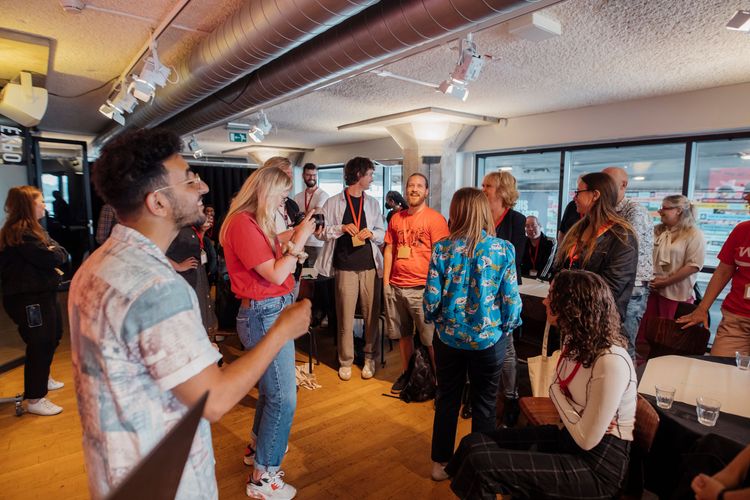Session: Everyday Data (H)acktivism Workshop
https://conference.publicspaces.net/en/session/everyday-hacktivism-workshopNaam/name Notulist: ImmeDatum/date: 28-06-2023 11:00Sprekersnamen/speaker names:
Shownotes
(mentioned links, books, podcasts, literature, etc.)- - Data colonialism - Nick Couldry
- - Library of missing datasets - Mimi Onouha
- - Feminist datasets - Caroline Sinders
- - The Flemisch Scrollers - Dries Deporter
- - The Gender Pay Gap Bot
- - Slaves Esclaves - E.B. Du Bois's Data Portraits, 1900
- - https://data-activism.com
Live notes (500-750 words)
Please use full sentences and write in the spoken language of the session / Graag volledige zinnen gebruiken en de taal aanhouden van de sessieThe workshop starts with a round of popcorn introductions. You stand up and say what you want to work on related to data and which acts of data activism you've engaged in. But as soon as someone else in the audience hears a keyword they relate to, they can take over the introduction. Keywords that trigger new responses are deplatforming, developers, climate, citizen science, open-source, cultural sector and Groningen.
Abdo starts off with an introduction, his carreer started in software engineer in the space industry. Currently he's a poet and digital ethicist advising organizatoins on data and technology questions. In his work he deploys two lenses: The love for play and always keeping his eyes on power structures.
He discusses the concept of harm in data and algorithms. Examples are your voice or accent not being recognized by an AI system or being targeted because of your zip code. It means algorithms can do violence to people. Powers that have influence on this include big tech, government, platforms and groups in social/cultural majority groups. Data can be seen as a form of national resources that can be extracted, which links closely to the idea of data colonialism. It's ancored on the idea that there is a predatory extractivise practises of historical colanisalsm with the abstract quantification methods of computing. For example, there are more Wikipedia articles written about Africa by people from the West, than written by Africans.
Rather, data should be an object of collective care. It means to consider what the data can do. Data activists play a role in understanding and questioning what the data can do. Data activism can be a process of: unveiling, reworking, unlearning or balancing. There is a need of a new paradigm of technology, where now we either have toxic positivity (tech is going to save us) or toxic negativity (we are doomed). Abdo tries to find the space in between of these two narratives for a new outlook on the future. To do so, he's build the playful Everyday Data (H)activism toolkit (see:
https://data-activism.com/).
The workshop starts and the participants are split into 5 groups to answer three questions:
Datasets should be...
Activists should be...
So that society...
Groups start mapping different words and concepts, and a wide variety of topics are passionately discussed. A small insight in the discussions:
Datasets should be visualizable, contestable, queer/inclusive/open, fair, transparent, intentional and caring. Discussions arise on data commons and how to manage them, how we organize privacy versus sharing, and how data consent and autonomy can be organized. Abdo notes that many governments implicitly collect data of their citizens, which will stay invisuble for most people, unless you come in contact with it.
Activists should enable action, be aware themselves and create awareness, have influence on EU level through helping draft legislation. An activist should be informed on how the data is used, and be able to help their communities with this knowledge to question power dynamics. The concepts of a social data worker or digital stewards are coined. Individuals that used data that is publicly available to help people be more active and to challenge the systems that we are in.
...
So that society can be a public space that works for everyone and that is inclusive, in which quality, security and inclusivity (and the normative aspects of all of these terms) are distributed evenly.
The workshop is concluded with the tongue-twister:
Data should be visualizable so
activists can make it tangible for a target audience so they can take action that leads to change in
society.
And a small reminder of data activism: The choice to wear the black keycord (meaning you do not want to be photographed during the Public Spaces Conference) is used as a form of activism by one of the partcipants to spark discussions on the topic of privacy and public space.
The room is invited to join the project and contribute to the living document.
